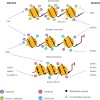Epigenetic mechanisms of induced pluripotency
- PMID: 25691819
- PMCID: PMC4322530
- DOI: 10.5114/wo.2014.47135
Epigenetic mechanisms of induced pluripotency
Abstract
Reprogramming of somatic cells to induced pluripotent stem cells (iPSCs) requires profound alterations in the epigenetic landscape. During reprogramming, a change in chromatin structure resets the gene expression and stabilises self-renewal. Reprogramming is a highly inefficient process, in part due to multiple epigenetic barriers. Although many epigenetic factors have already been shown to affect self-renewal and pluripotency in embryonic stem cells (ESCs), only a few of them have been examined in the context of dedifferentiation. In order to improve current protocols of iPSCs generation, it is essential to identify epigenetic drivers and blockages of somatic cell reprogramming.
Keywords: DNA methylation; chromatin modifications; epigenetics; induced pluripotent stem cells.
Figures
References
-
- Wilmut I, Schnieke AE, McWhir J, Kind AJ, Campbell KH. Viable offspring derived from fetal and adult mammalian cells. Nature. 1997;385:810–3. - PubMed
-
- Tada M, Takahama Y, Abe K, Nakatsuji N, Tada T. Nuclear reprogramming of somatic cells by in vitro hybridization with ES cells. Curr Biol. 2001;11:1553–8. - PubMed
-
- Takahashi K, Yamanaka S. Induction of pluripotent stem cells from mouse embryonic and adult fibroblast cultures by defined factors. Cell. 2006;126:663–76. - PubMed
Publication types
LinkOut - more resources
Full Text Sources
Other Literature Sources


